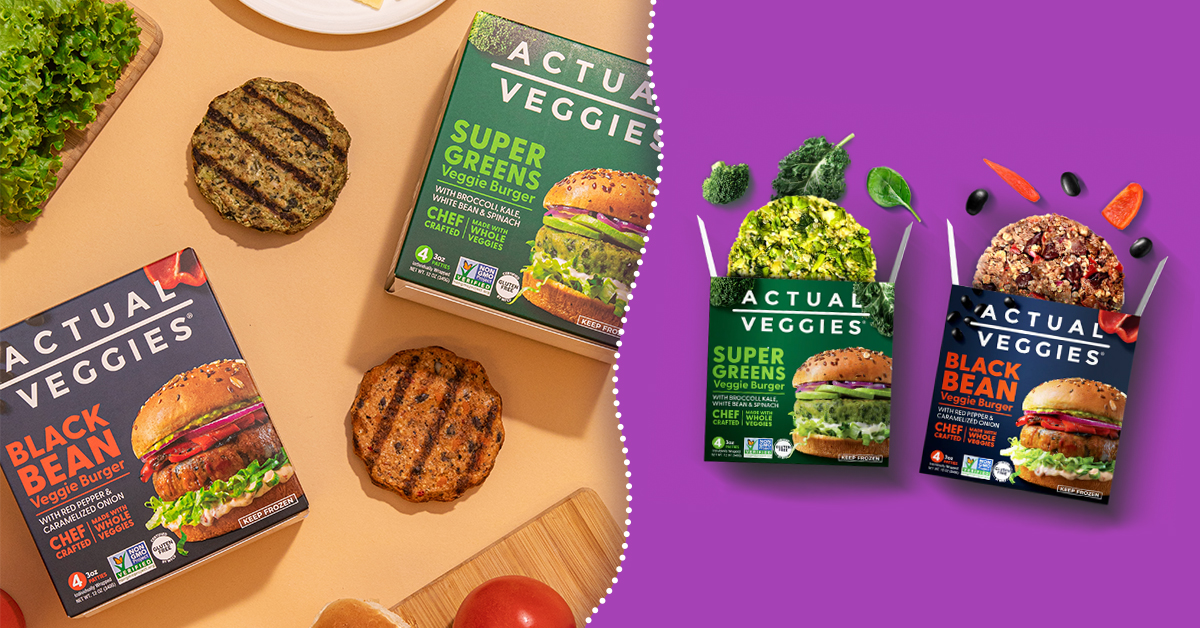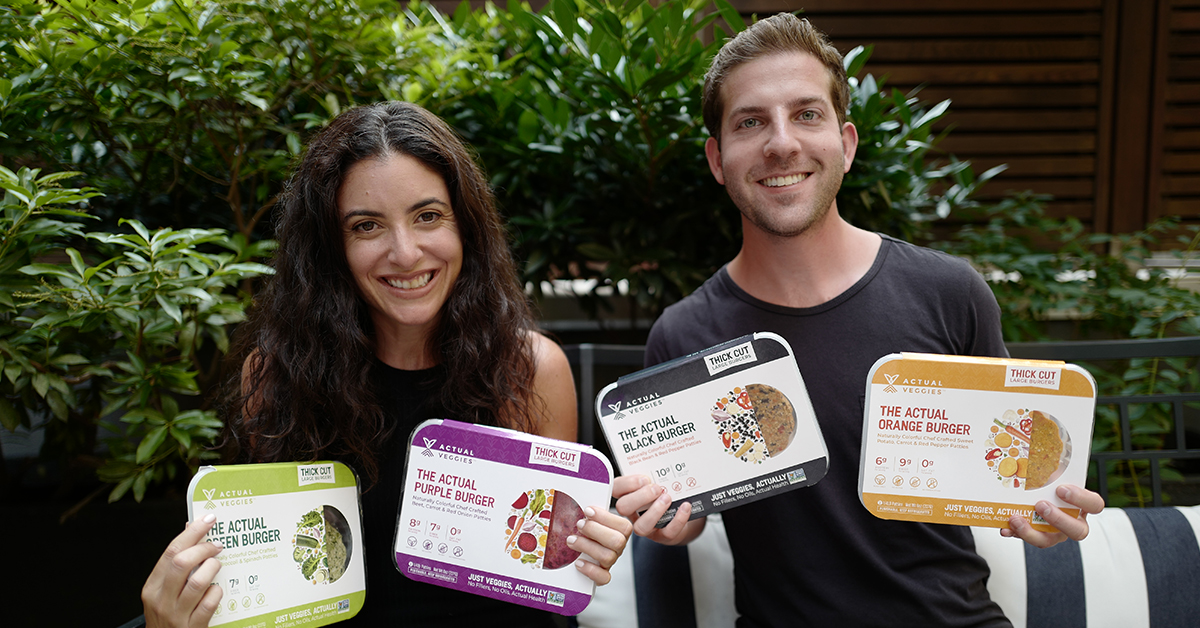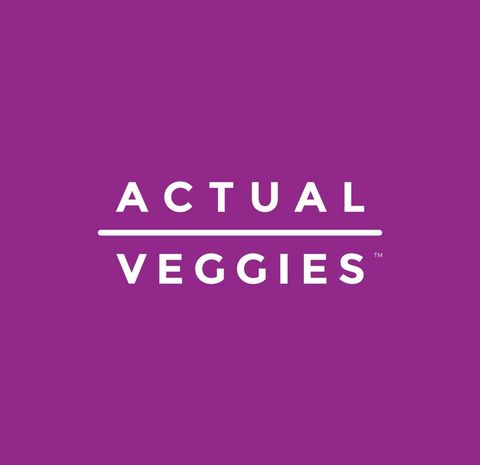Actual Veggies Leans Into Frozen Placement Flexibility, Lands WFM

Appropriately named Actual Veggies has flipped a portion of its burgers over to frozen this month, landing in Whole Foods stores nationwide. That shift – from its original fridge case placement to the freezer aisle – also comes with an updated brand identity and a box format better suited for the frozen set.
“We [originally] thought we were going to be in the meat section and we wanted to create a premium experience around the veggie burger – that meant seeing it,” said Hailey Swartz, co-founder of Actual Veggies. “We noticed as grocers were trying to bring fresh food to the freezer, they weren’t [always] slacking it out in the refrigerator. While the tray experience is beautiful… it doesn’t necessarily make sense for the freezer buyer to have to use the space for a tray.”
The ability to flex between the fridge and frozen may also help Actual Veggies attract new consumers to the brand. Most grocers have dedicated plant-based refrigerated sets, but these shelves typically cater to plant-based dairy products, tofu and other animal-free items while veggie burgers are normally placed in the frozen aisle. Frozen placement also helps reduce chances of spoilage from mismanagement, noted co-founder Jason Rosenbaum, because as a fresh product, the burgers have a much shorter shelf life.
The now two-year-old brand sells a line of “chef-crafted” vegetable burgers built around a “color palette,” said Swartz. The original lineup includes The Black Burger (Black Bean), The Orange Burger (Sweet Potato), The Green Burger (Kale Broccoli) and The Purple Burger (Beet). Since then, Actual Veggies has continued to expand its lineup and now makes breakfast burgers, a truffle burger and launched a line of veggie balls exclusively with HungryRoot late last year.
For now, Whole Foods will stock both the Black and Green burgers in its frozen aisle, but Actual Veggies’ co-founders see the brand’s ability to flex between store sections – as it does at Kroger, The Fresh Market and Wegmans – as an important tool for its retail growth. The product is currently in about 2,600 stores nationwide in a range of pack sizes and formats including 2, 3, 4 and 6-count packs that can be merchandised in either the fresh or frozen aisle. A 2-burger pack retails for about $7.29.

“Our goal is to get to placement in the freezer and the refrigerator,” said Rosenbaum. “In some stores refrigerated makes sense… and in other stores where refrigerated just doesn’t make sense, especially in the conventional channel, [having] a frozen option just makes things a lot easier.”
Other refrigerated brands that shipped to stores frozen with the intention of being slotted in the fresh set have struggled with similar category dynamics. Siete’s tortillas, Beyond Meat’s burgers and sausages and Caulipower’s tortillas have all been sold refrigerated or frozen, depending on the retailer and, for larger chains, the region. After growing brand awareness and sales, these brands have been able to lock in consistent placement.
Actual Veggies has had a fluid approach with its sales and channel strategy since starting the business in March 2020. Originally sold direct-to-consumer, the company’s first retailer was QVC (where it sold $75,000 worth of patties in 2021), before launching in Sprouts Farmers Market, and on HungryRoot, Imperfect Foods and FreshDirect just months afterwards.
“The most amazing part of it is even though QVC’s audience is Middle America – we sold out of all of our products in eight minutes,” said Swartz. “[We said] if we are in front of Middle America with no brand awareness, in between a show about ham and another about chocolate chip cookies – and we can sell veggie burgers – we’re onto something.”
The product-market validation from that experience helped the brand lock in some initial co-manufacturing partnerships, Swartz said, and soon it began selling online via grocery platforms like HungryRoot, Purple Carrot, and even animal protein-forward Butcher Box. The team said its own direct-to-consumer platform has not been a focus for its distribution strategy, explaining that the cost of shipping cold did not make sense for the early-stage brand, instead leaning into DTC partnerships. Swartz noted that during their early online-only days, the product’s refrigerated attribute actually helped give them a leg up with ecommerce platforms that lacked frozen capabilities.
“These [online] retailers really needed and were looking for products like ours,” said Rosenbaum. “It was just a natural fit… What’s so cool about these online retailers is they move fast, not like a traditional retailer… which made it such a good fit for us to launch our brand.”
But as the brand, and plant-based market matured, Actual Veggies has had to evolve as well. Rosenbaum believes that the brand “was built for natural,” but now, two years in, he said it has significantly more distribution at conventional outlets landing shelf space at Kroger and nearly all of its banners as well as “semi-conventional” Wegmans, among others. He hopes that with this new increased presence in the natural channel, the brand can use Whole Foods to help the brand embrace its next era and create more whole food-forward products, free from oils, preservatives, binders, and fillers.
“Whole Foods is the ultimate launching pad for us so we’re already thinking of new innovation and new flavors that we can present and hopefully launch with them next year,” he said.

















